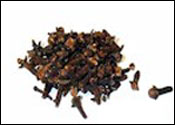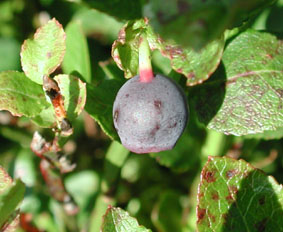 |
Clove |
 |
Clove |
By Rob McCaleb
Traditional Oriental medicine includes the 2,000-year-old knowledge that certain mushrooms and other fungi are medicinal, with effects ranging from mild health promotion to powerful psychoactive actions. Today, a variety of mushrooms is available in the United States. These include shiitakes, portobellos, oyster mushrooms and morels, among others. In addition, the medicinal effects of mushrooms are becoming known to Americans. Medicinal mushroom research is producing evidence of cardiovascular, anticancer, immune-stimulating and antioxidant benefits bound to identify mushrooms as major natural medicines. This information is not intended as medical advice.
In general, medicinal mushrooms are used as preventive medicines. Their major actions include helping the body adapt to environmental stress; increasing general resistance to disease; protecting against heart and artery disease, toxins, mutagens and free radicals; preventing age-induced damage to cells and tissue; and protecting the liver against toxins.
Reishi Mushrooms
Reishi is a large, dark, bitter mushroom with a glossy exterior. Because of its intense bitterness reishi has never been favored as a food source but has enjoyed a long-standing medicinal reputation. This mushroom has been used for more than 4,000 years for a variety of conditions and also as a general health and longevity tonic. Its historic use includes the treatment of conditions of the lungs, kidney, liver, cardiovascular system and digestive tract.
A variety of active chemical components has been found in reishi mushrooms. Some of reishi's components are active against tumors, while others increase the body's production of a natural tumor-destroying compound called tumor necrosis factor.
The mushroom's major chemical components are active as are whole extracts of the mushroom. The extracts have been confirmed to have important cardioprotective benefits including reducing blood cholesterol levels, preventing oxygen deprivation of the heart muscle and even improving symptoms of active heart disease. Research on reishi mushroom also demonstrates its benefits against hepatitis B, allergy, bronchitis, high blood pressure and coughs, along with radiation protection and significant liver-protective and curative effects.
Reishi mushrooms are available in tablets, capsules, tinctures and teas and in soups, syrups and ampules.
Unlike the bitter reishi mushrooms, shiitakes are prized for their flavor and nutritional value. In contrast to the multitude of active components found in reishi, almost all research on shiitake is on an extract (LEM) of the mycelium (essentially the root of the mushroom) and a component of the cell wall called lentinan. Lentinan is a high-molecular-weight polysaccharide with a triple helix structure. Scientists believe this unusual shape is important to the activity of shiitakes. Lentinan and LEM have shown strong antitumor activity in humans and animals when taken orally and by injection. These substances aren't directly toxic to tumors, unlike modern chemotherapy agents, and hence aren't toxic to humans. Rather, they work by mobilizing our natural defenses against the abnormal cells that make up a tumor.
Shiitake has also been found to stimulate the immune system against viral diseases, bacterial and parasitic infections and even shows intriguing activity against HIV. Like the reishi mushroom, shiitake is liver protective and shows some activity against hepatitis B. It exhibits similar cardiovascular benefits as well, lowering blood cholesterol, lipids and blood pressure.
Maitake Mushrooms
Research on maitake, especially for its anticancer potential, nearly matches that of shiitake. As with much of the laboratory research on anticancer plants and their components, most of the research on maitake has been done by injection. One study showed tumor inhibition occurred with injected doses of the mycelium compound grifolan, but it found no effectiveness orally at any dose. However, another study using large quantities of oral dried maitake (20 percent of the diet) did show tumor inhibition by up to 86 percent. Oral usage of the maitake extract and its active components also proved effective as immunostimulants, increasing the activity of macrophages, T-cells and increasing production of interleukin- I. These results have encouraged some preliminary clinical research of maitake extracts against cancer. In the last year there have been intriguing preliminary reports of possible benefits against several types of cancer and AIDS symptoms including Kaposi's sarcoma.
Maitake mushrooms also reduced blood pressure in laboratory experiments in both normal and hypertensive animals and reduced blood cholesterol levels. There was also a hepatoprotective effect demonstrating that maitake can protect the liver against one of the most common and potent liver toxins to which Americans are exposed—acetaminophen, or Tylenol. A concentrated extract of maitake also produced positive results in a clinical trial with 32 hepatitis B patients, inducing a 44 percent cure rate (versus 13 percent in the control group).
Other Medicinal Fungi
Two more fungi, although not mushrooms, are worth mentioning. The first is tremella, the jelly fungus. This strange, seaweedlike fungus is popular in Chinese cooking. It's long been considered by the Chinese to be beneficial to the heart and has been found to lower blood cholesterol and blood pressure. Various species of tremella have also been found to inhibit tumors and treat asthma as well as bronchial inflammation.
Another fungi is the kombucha, or tea mushroom, a symbiotic community of organisms including several yeasts and bacteria. It's grown in black or green tea sweetened with sugar. The finished brew contains fruit acids and a small amount of caffeine from the tea in which it's grown. It's touted for antiaging effects, cancer prevention and a wide variety of other purported uses including arteriosclerosis, high blood pressure, constipation, mental fatigue and low sex drive. Although popular literature abounds, there's currently no sound scientific evidence to support the claims made for this tea.
Rob McCaleb is president of the Herb Research Foundation in Boulder Colo. For more information, call 800-748-2617.
Reprinted with permission from the October 1995 issue of Delicious! Magazine, a publication of New Hope Communications, Boulder, CO.

Bilberry